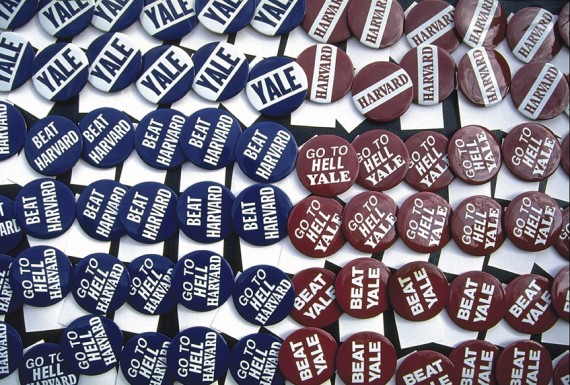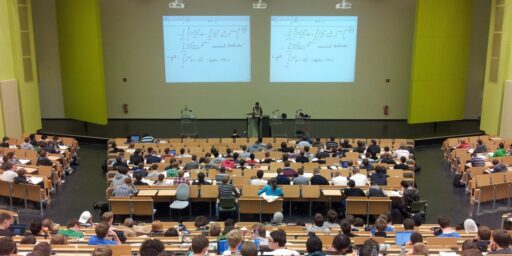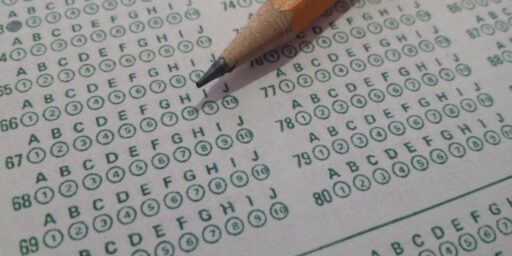Elite Schools Emphasizing SAT Scores at Cost of Racial Diversity
An increasing emphasis on high standardized tests scores is hurting efforts to recruit more black and Hispanic students.
An increasing emphasis on high standardized tests scores is hurting efforts to recruit more black and Hispanic students.
While much of the panel discussion focused on inequality in American society, another group of institutions was also criticized for decisions that — without affirmative action — hinder the enrollment of minority students. Top colleges, the researchers said, are putting more emphasis on extremely high SAT scores, even though this means that the resulting pool is increasingly white and Asian.
In a paper called “Is 1500 the new 1280?” Catherine L. Horn, of the University of Houston, and John T. Yun, of the University of California at Santa Barbara, looked at the verbal SAT score averages of students at the 30 top colleges and universities (as determined by U.S. News & World Report). At all but four of these institutions, at least 30 percent of the freshman class had scored 700 or greater on the verbal SAT, and at half of these colleges, more than 50 percent of freshmen have such scores. In 1989, only one of the 30 colleges reported that more than 30 percent of the freshman class had a score of at least 700 on the verbal SAT.
The shift is “extreme,” Horn said, “suggesting a real shift in admissions toward very high-scoring individuals.”
While the SAT has been substantially changed re-normed and otherwise altered in the quarter century since I took the test, making direct comparison difficult, it’s probable that I would have been uncompetitive. Then again, that’s an entirely academic consideration since I would have been unable to afford these schools even if I had gained admission.
Graduating from an elite institution opens some doors that are otherwise harder to get through. An Harvard graduate is more likely than a comparable one from Western Kentucky to be admitted to an elite professional or graduate school. They’re also more likely to be hired at prestigious entry level jobs in journalism, to get the best internships, and so forth.
At the same time, getting one’s education at a regional university with little national name recognition is hardly a professional death sentence. Relatively few people, after all, go to Harvard. The vast majority of our doctors, lawyers, engineers, professors, and so forth did their undergraduate work at a school you’ve never heard of or, at least, one whose name doesn’t inspire ooh’s and ah’s.
Admission to one of the top 30 schools is, by definition, very limited. To the extent that it’s increasingly being granted on the basis of objective merit, that’s a good thing.
UPDATE: Tyler Cowen quotes from a related study:
Overall, we find that the current generation is more skilled than the previous one. Blacks and Hispanics have gained relative to whites and women have gained relative to men. However, skill differences within groups have increased considerably and in aggregate the skill distribution has widened. Changes in parental education seem to generate many of the observed changes.
Mostly good news, I think. There’s no group ceiling on skill acquisition. At the same time, there’s no doubt that those having educated, motivated parents are increasingly advantaged.







Bravo. That’s called ‘equality’.
“The vast majority of our doctors, lawyers, engineers, professors, and so forth did their undergraduate work at a school you’ve never heard of or, at least, one whose name doesn’t inspire ooh’s and ah’s.”
It’s getting to the point that an ever-increasing number of doctors and engineers are coming from countries you’ve never heard of …. or, at least, ones whose names do not inspire oooh’s and ah’s…..
I have a hard enough time trying to figure out the doctor’s doublespeak without trying to figure out the heavy accent that’s being used.
But that’s just me.
Well, mostly India. But that’s not an education issue but a supply issue. We don’t grow enough physicians and the incentives are to move to the big cities where you can get more for your services.
Question, James: “Are foreign students taking the SAT’s, or are their admissions predicated on an entirely different set of standards?”
I’m just wondering if our homegrown minorities are being cut out by foreign admissions.
Only if everybody has equal access to the tools and resources to obtain the same level of academic merit. More likely the argument is that schools that serve minorities are not, due to a lack of capability or effort, providing minority students with the same quality of education and their majority counterparts.
No. At the MS and PhD level at least, we are starved for domestic minority applicants.
Note that many of the top schools, such as Princeton, provide very generous financial aid, based on your parent’s tax returns, etc. You may have been able to afford them.
No.
REGARDLESS of that point. That is a seperate issue. If there’s a problem with the educational level of students inbound, you don’t address that by lowering the requirements, which results in students woefully out of place and out of their ability, you address that rather, at the lower level schools.
And isn’t it interesting that these are government schools w’re talking about, that turn out such students?
There are differences, but let’s say for example, that you swapped all the students at the high school I attended with all the students at a “bad” one. I doubt that the students from the bad one would improve much.
There were a number of African-Americans at my high-school. There were a few blacks that were good students, and I’m sure that they are all now solidly middle-class Americans with good incomes, etc.
Then there were a bunch that had no interest in school, and had no respect for “smarts”.
Amazing. There is something I agree with Bithead about.
It’s the same issue, just a different location. You can’t say everyone has equal access to top universities when they don’t all have equal access to the tools and resources necessary to qualify.
I quite agree, and I would hope that whatever study is being cited suggested that solution, instead of lowering requirements at the university level.
Not really interesting, and certainly not surprising. Like they say: Good, Fair and Cheap, pick any two.
True, I’ve known many people like that myself, where no amount of access to quality education would have resulted them in actually obtaining quality education. You can lead a horse to water, as they say. But there is also an undeniable disparity between the quality of education students have access to depending on their location. Whether this is the cause of effect of disinterested students I will leave open to debate.
True. But I was in that gigantic ‘tweener category, with my dad making enough money that we weren’t poor but not nearly enough to pay for Princeton. And, frankly, I didn’t have much of a clue as to what going to one of the Ivies meant, anyway.
In principle, the amount of aid is supposed to be graduated so that it is at least possible for a student from any economic background to attend.
I realize that “in principle” can deviate greatly from “in practice”, so I don’t dispute your situation. I only mention this in case there is someone reading who is thinking about applying. Don’t completely rule it out based on fear of not being able to afford it.
I would rephrase this slightly to “having motivated parents who value education”. The parents themselves don’t have to be educated.
I personally think that culture is the single most important factor in the US today, above how good the schools are, discrimination, etc. Yes, schools are different and probably have some effect. Yes, there is still racial discrimination of various forms.
But a strong culture of education, social support networks, stability, hard work, etc. can overcome a lot. On the other hand, a total absence of discrimination and a total equality of schools cannot overcome young, unwed mothers, absent fathers, sports worship, disdain of education, disdain of intelligence, lack of role models, etc.
All the black sports and entertainment celebrities would do a lot of good, I think, if they made a regular and well-promoted habit of telling young blacks how much they respect people like Obama, McWhorter, Winfrey, Powell, Richard Parsons, etc.
But again the question is, can we change the culture by providing better education, or must we provide a better culture before a better education can be obtained?
Nonsense.
Let’s break this down; What is preventing them from having such access?
Without the culture, nothing else works. Cultural values over-ride everythng else.
Period.
The non-existance of, or low quality of, resources, material, and teachers in the public school they are zones for.
There are many factor, but this is sufficiently broad to get us started.
And how do we improve the culture of a population?
No.
Simply remove government from the equation, and all three at once becomes possible.
Who will provide the education if not the government?
I think it depends. There are a lot of dimensions to the question. There is what might work, if you could get it implemented. Then there is what you might be able to get implemented.
If you could allocate $30 billion dollars to improve schools, unfettered by bureaucracy, etc., maybe it would work. That’s highly unlikely to happen though. And maybe it wouldn’t work, even if well-implemented.
Frankly, I’m pessimistic. The most effective source of cultural change is from the communities themselves, but prospects for that seem low. Outside of the communities, there is no large enough group of people who care enough to make change happen (through whatever means, by improving the culture or starting with the education). For real change to happen, a large enough group of people have to make it their cause.
Like I said, pick any two. Good and Fair will not be cheap.
True, sometimes you just get to pick one.
The US spends more on primary and secondary education then almost any other country (according to nationmaster, 4th highest per primary student and 3rd highest per secondary student).
To suggest that the problem with education in the US is resources is simply unsupportable by the evidence.
Resources != Money
You can by truckloads of coal, or whatever other resources you want with money.
Teachers? Maybe. Materials and resources? A few textbooks, pencils, etc., don’t seem like they would cost that much.
But here’s a thought experiment. Suppose I said I would give free tutoring to any disadvantaged high school student who showed up at the public library. How many would actually come?
Wow. A target rich environment.
Like it or not you’re arguing to remove Government from the educational system… and so am I.
Much of your commentary is explained by this one question. That said, the answer is up to the parents…. and that choice will be far easier to make, once we’re not taking all that money in school taxes from them. Do you think for a minute that private orgs won’t leap up to fill the void? and they’ll do it cheaper and more effectively. Government has proven itself a poor custodian of the educational system As Mike B says:
Clearly, then the problem lies elsewhere…. and the only aspect left is the government itself… who has records in nearly everything they attempt, as abysmal as the one surrounding their attempts at education.
I’ll have more on this later, but I think I’ve painted a large enough dayglow circle on my back to keep you busy for now.
Yes, but that coal isn’t going to improve anybody’s education. What matters is _what_ you buy with the money, not how much money you spend on it.
Multiply that by millions of students, and it adds up quick.
Depends on many factors, where is your library located? Is your target customer going to be available (i.e, not working) during the time you’re there? Still your point is taken, our current culture doesn’t treat education as valuable, so even offering it for free won’t attrack too many people.
I’m fine with removing government from the education system, as long as we replace it with something better.
It’s only up to the parents when they have 2 or more equal choices, right now they don’t. Since schools I believe are largely paid for in property taxes, and many poor people are renters, I’m not sure how much financial difference it would make to them.
Private orgs will always be willing to fill the void, I’m just worried about what they’ll fill it with. Blackwater filled a void in Iraq, but that doesn’t mean they were better at it than the US Army. Certainly I don’t want Blackwater’s educational equivalent in charge of my child’s education.
I’m pretty sure that isn’t the only aspect left, but even if it were, you still haven’t proposed a suitable replacement.
Which means, just about anything.
I’m not…. not nearly as much as I am worried about what government has filled it with. By your own point, opening the education monopoly up to private concerns eliminates the situation where most parents only have one choice.
Can you imagine that a better product wouldn’t be produced from that scenario?
Yes, I have… and the ONLY suitable chocie, at that.
Privatize.
I would rephrase this slightly to “having motivated parents who value educationâ€. The parents themselves don’t have to be educated.
I agree that tool aquisition is better when parents value education, and strive to pass that value on to their children, but if they are undeducated, they still put up some road blocks to learning-it isn’t insurmountable, but it is more difficult.
I work in a predominately poor (well below poverty line) school district. The biggest road block I see to educating a lot of the poorer children, even when parents are supportive and involved is the lack of experience.
These kids have small vocabularies, most have not traveled outside the state, most have not even been to a large city (we live in rural NH, the biggest city isn’t all that big). Many of them haven’t even seen the ocean, even though an hours drive could get them there.
The disadvantage for these kids, is unlike kids who have educated parents, they don’t come to school already equipped with tools to help them learn and understand more easily what they are learning.
So education can make a difference, although teachers can provide more enrichment into the school day to help make up for some of these.
I would agree that if we are talking about schools at the elite level, that this can make a difference. However, I disagree that this is the primary reason certain populations in the US are trapped in cycles of poverty.
There are countries in the world that started off extremely uneducated, but in 50 years have made a great deal of progress. For example, my grandfather didn’t even enter high school, much less finish.
Well, as has been noted, the two issues are linked. But when you place the responsibility for education on the shoulders of the parents and not the government, the parents become more involved. I submit that most of the current cultural issues… the programmed mediocrity, I call it, falls in the realm of lack of parental involvement. When it’s the government’s task, the individual tends to be less concerned about it. “It’s their job”.
We see where such attitudes have gotten us when we read the record of the government schools.
Okay, then the question now is how do we get parents involved in their children’s education? I don’t see how privatization would change parental interest.
Which means just about nothing at this point, because nobody is ready to take the government’s place.
So each private school will decide what to charge, what to teach, where to teach, and who to teach?
Yes, I can. I don’t imagine any private company would want to run a school in a poor, crime-stricken neighborhood. I don’t imagine any private company would want to run a free-admissions school. I don’t imagine any private company would stand up to the parents of a majority of the students and insist on teaching factual science instead of pseudo-science.
Not currently a suitable choice, for the reasons listed above. Unless you can detail some plan where a privatized school system will offer a free, standardized education to any and all students wishing to attend, and provide free and safe transportation for any and all students to and from said schools.
Yes. That’s called ‘Freedom”.
And the parents, of course will make chocies about what school to send heir kids to, at least partially based on the curriculum. That’s called being responsible in freedom.
Has it not occurred to you that this goal is in fact causing the horrendous failings, and that your demand is that we continue the failings?
So, a Madrasa that teaches hatred of Jews and America would be an acceptable substitute to our current public school system in your view?
What happens when all of the schools in my area teach creationism as fact, because I live in a very conservative area and most parents will want a school that teaches that, but I want my children to learn actual science? Who pays for transporting my kid 50 miles to the nearest school that does that?
Trying to reach that goal may have caused a failing in our school system, but that doesn’t mean the goal is not a good one, or that we should not be trying to reach it. As detailed above, having a non-standardized education system may very well _remove_ my choice of sending my kids to a school that teaches science. Certainly we shouldn’t be letting schools teach kids anything, without regard to the truthfulness of the information, should we?